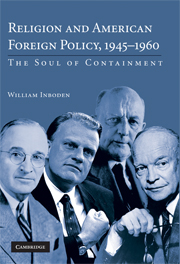Book contents
- Frontmatter
- Contents
- Preface and Acknowledgments
- Introduction
- PART ONE
- PART TWO
- 3 The “Real” Truman Doctrine: Harry Truman's Theology of Containment
- 4 To Save China: Protestant Missionaries and Sino–American Relations
- 5 Guided by God: The Unusual Decision-Making of Senator H. Alexander Smith
- 6 Chosen by God: John Foster Dulles and America
- 7 Prophet, Priest, and President: Dwight D. Eisenhower and the New American Faith
- Afterword
- Bibliography
- Index
- References
4 - To Save China: Protestant Missionaries and Sino–American Relations
Published online by Cambridge University Press: 31 July 2009
- Frontmatter
- Contents
- Preface and Acknowledgments
- Introduction
- PART ONE
- PART TWO
- 3 The “Real” Truman Doctrine: Harry Truman's Theology of Containment
- 4 To Save China: Protestant Missionaries and Sino–American Relations
- 5 Guided by God: The Unusual Decision-Making of Senator H. Alexander Smith
- 6 Chosen by God: John Foster Dulles and America
- 7 Prophet, Priest, and President: Dwight D. Eisenhower and the New American Faith
- Afterword
- Bibliography
- Index
- References
Summary
Adopting containment as the strategic doctrine of the United States raised almost as many new questions as it answered old ones. For instance, how were the lines of containment to be drawn? Would the United States try to contain only the Soviet Union, or all of global communism? And how did containment apply to the turmoil in China? This last matter caused policymakers particular consternation. Perhaps no other nation aroused as much passion and contention among the American people. This mysterious land in the Orient had long enchanted the American imagination. In the early twentieth century, explorers, sailors, traders, and missionaries – especially missionaries – returning to the United States from their China sojourns brought tales of an ancient civilization, innovative inventions, unusual cuisine, and a people allegedly in desperate need of Western culture and the Christian faith. Public figures such as Time-Life media baron Henry Luce and author Pearl Buck, who had spent their childhoods in China as missionary children, kept China in the headlines and in the forefront of many American minds.
Chinese President Chiang Kai-shek's apparent Christian faith only added to this allure. Following Sun Yat-sen as the second president of the Republic of China, Chiang also adopted his predecessor's religion, as did a number of his Nationalist colleagues. Chiang's conversion and baptism in 1928, widely publicized in American church circles, further endeared him to many Christians in the United States.
- Type
- Chapter
- Information
- Religion and American Foreign Policy, 1945–1960The Soul of Containment, pp. 157 - 189Publisher: Cambridge University PressPrint publication year: 2008



